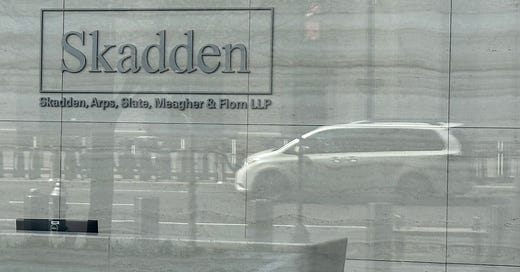Law students organize to give Trump-caving firms a recruitment problem
By creating a spreadsheet, Georgetown Law students sparked national headlines, along with PR headaches and staffing challenges inside the world's most powerful firms.
The day after Donald Trump’s election last year, three Georgetown Law students started a political movement to brace for impact.
The students texted each other, started organizing, and eventually discovered the ability to perform a simple act to put the world’s wealthiest and most powerful law firms on the defensive.
They created a spreadsheet.
“Fascist Attacks Tracker”
After Trump signed executive orders singling out law firms for political retribution, the students recorded BigLaw’s responses in a document they titled “Legal Industry Responses to Fascist Attacks Tracker.”
The Google spreadsheet currently names more than 800 firms, assigning them to one of five stark categories: “Caved to Administration,” “Complying in Advance,” “Other Negative Action,” “Stood Up Against Administration’s Attacks,” or “No Response.”
The document started out a resource to help fellow Georgetown Law students make informed decisions about potential future employers.
Mari Latibashvili, one of the student organizers, said in a phone interview: “We didn't know how big this was going to get. It was just giving the students the opportunity to see what the firms that they were considering were doing and to show them alternatives.”
But it grew into something much larger.
Forbes first picked up on a trend of students turning down the possibility of six-figure salaries from the likes of Skadden Arps, Paul Weiss, Milbank, and Willkie, Farr and Gallagher, which all entered into settlements providing the Trump administration with tens of millions of dollars in pro bono legal services. One Geogetown first-year law student (1L) interviewed for the story reportedly skipped a Skadden interview. (The firms did not immediately respond to emails requesting comment.)
Politico then reported that these individual choices resonated industry-wide, speaking to students, recruiters, and partners at major law firms.
Now, the firms themselves have tried to lobby the student organizers directly to get their rankings changed.
“Firms have been emailing us asking to be added to the tracker, have their designation changed, and / or have other edits made to their entries,” Latibashvili told us.
Possible Action Item:
Keep informed on Trump’s attacks on BigLaw — and talk about them with people you know in the legal community. Federal judges found Trump’s executive orders likely violate the First, Fifth and Sixth Amendments to the Constitution.
Just this week, two firms asked to permanently block Trump’s executive orders. One judge said in court on Wednesday: “It’s retaliatory. There’s no question in my mind.”
How it started
An aspiring civil rights attorney and 2L at Georgetown Law, Latibashvili remembers the three-way text chain where the initiative took root.
“The Coalition for Justice came about literally the day after the election in November and it was literally just a text from me to my two friends that are also student leaders at Georgetown,” Latibashvili said in a phone interview.
Black student associations, reproductive rights groups, pro-Palestine groups, and local chapters of the American Civil Liberties Union and the American Constitution Society got involved, at first, to address other Trump administration power grabs affecting students.
“We were talking about the deportations, and folks essentially being kidnapped by the Trump administration,” Latibashvili said, referring to pro-Palestine student activists being whisked to an immigration jail in Jena, La.
She remembered the problem seeming daunting: “We're just a bunch of our students: Most of us are just 2Ls.”
Sensing that some universities were working with the federal government — and against the students’ interests — Latibashvili said that students settled upon a simple approach for accountability: “What if we just like tracked who was doing it, and who was standing up, and then we just like let folks know? We made it super-transparent.”
She estimated that a dozen students worked together on the detailed spreadsheet, which had 853 entries by press time.
“Absolutely floored”
The students quickly saw their impact.
Latibashvili recalled being “absolutely floored by all the support, the positivity and the really, genuinely heartfelt and thoughtful emails that we're getting from people about it.”
“It really ranges from people who currently work at law firms being very grateful for doing this and for helping them recognize that they also have power within their roles to law firms emailing us and saying, ‘Hey, we wanted to update you,’” she said.
Sometimes, she said, those firms would ask to change their designation — or get themselves out of the “No Response” category by providing information to win the label best for recruitment: “Stood Up Against Administration’s Attacks.”
“I think the fact that students are doing this, and the fact that folks that have much less power — who are six figures in student debt — the fact that we are the ones doing this shows that they can too, and they should not be afraid to,” Latibashvili said.
She summarized the students’ message to BigLaw simply: “Don’t disappoint us.”
Editor’s Note:
Apathy is authoritarianism’s best friend.
Empowerment starts with being informed, not just with the news, but with how you can push back if you’re horrified by what’s in the news. All Rise News is formed to remove powerlessness from your news routine. Join us now to push back!






This is utterly fabulous! Thank you for this dispatch.
Thank you for this piece. I am forwarding it to my daughter who is a partner in a DC firm that just voted to stand up to $trump.